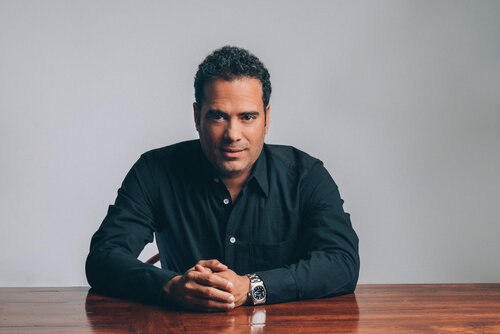Of Mice and Men is a title that does not go unrecognized in America. John Steinbeck wrote this great American classic in 1937 and was immediately adapted to Broadway the same year. Since its release, there have been numerous adaptations, such as the most recent Broadway play at the Longacre Theater. This 18-week run has had marvelous success, as well as proving to be a moving adaptation with its flawless casting and set design by Todd Rosenthal. This wonderful combination of talented actors and detailed rural sets makes it sad to see the play hitting the end of its production in a few weeks on July 27th. In this interview with Jim Norton, Cliché’s own Heather Glock spoke with the actor who takes on the role of Candy, the farm’s aging and disabled stage hand with a dream as big as his heart. Jim opened up about the importance of the themes in the play, the American Dream and his underdog role.
Photo: James Franco as George and Jim Norton as Lennie
Photo Credit: Richard Phibbs
PLEASE NOTE, THIS ARTICLE CONTAINS SPOILERS
Cliché: This book was banned during its original release and was considered controversial due to the discussion of sexual matters and the comparable acts of euthanasia towards the death of Lennie. Would you consider Steinbeck’s work still a thorn in morality’s side, or perhaps an honest reflection of the predatory nature of human life?
Jim Norton: I think we have moved on a lot since the book was originally published. I do not think that the attitudes are prevalent now as they were then. I was nineteen when I first read the book; I come from Ireland, and I was brought up in Dublin. And I remember very well getting my equity card when I was 19 and some senior actors that I was working with at the time suggested that it was time that I read some good American literature and the first Steinbeck novella I read was Of Mice and Men, so it has a very pleasant memory for me. That lead me to read everything that Steinbeck wrote. I was very impressed by his attitude towards life and his politics and philosophies. It’s rather interesting that all these years later that I would end up playing Candy.
The American Dream is a central theme in this work. Your character strives to make his dream with George and Lennie come true, since he fears his disability will declare him useless at the ranch. Do you believe that Americans are pushed to this dream when they realize that they have outlived their usefulness?
I suppose when you see the huge disparity between those whom have and those whom haven’t, which sadly still exists. It is a very sad situation. Candy was an agricultural laborer and they [the laborers] were underpaid and were oppressed. They were like tramps that rode about the state looking for one job to another, and the farm workers were degraded and badly paid. I think Steinbeck writes beautifully about this incredible loneliness and anger and hopelessness of the lot. Nobody in the story gets what they want. It is very bleak in that respect and Candy sees a little ray of light if he joins up with Lennie and George. He finally feels that he lost his dog and he lost everything, but finally, towards the end of his life, that he can find somewhere restful and quiet and some control over his life–and of course that is taken away when Curley’s wife is killed.
Of Mice and Men dismisses women from the men’s dream of paradise, as well as displaying their sexuality as a trap to ruin men. This is made clear at the climax with Curley’s wife to the last scene in the clearing. It is almost a mirror image of man’s fall from the Garden of Eden as Candy, Lennie, and George’s perfect world is destroyed. How does Leighton Meester handle this role in the male-dominated production?
She is terrific! She is wonderful. There are only two females in the play; Curley’s wife and Candy’s dog, and none of them are given names, which I think is a deliberate ploy on Steinbeck’s part to point out to us on how unimportant women were in that world; how unimportant Curly’s wife is, even though she was the catalyst for what happens in the play. I think he [Steinbeck] was making a very strong point there.
This famous book has been adapted into different movies and TV movies, as well as Steinbeck penning a stage play the same year the book was released. Audiences have also witnessed an opera in 1970 as well as a recent radio play. What is it about this American classic that stands the test of time? What personally drew you in?
Well, it is just a great story. I mean we are looking for stories and we want to hear great stories because they make sense of our lives. I think that is its great appeal. The fact that this story has been done in so many versions and so many different types of media is because it is a great human story about dispossessed Americans, but it also has a universality that goes beyond that, and that I think is it’s great appeal.
Dominance is a big element in this work. Due to the treatment and lifestyle on the ranch, most workers such as Curley possess this aggressive behavior and easily dismiss the weak and impaired. Candy is kind and never tries to gain respect through intimidation. Due to his insecurities and kindhearted nature, do you personally feel that the audience can empathize with Candy, perhaps because his fears are relatable and the audience wants to see the underdog succeed?
Oh, very much so! There is this great empathy that you feel every night on stage, particularly the moment when they take the dog away. There is the most incredible silence that you rarely hear in the theater, and the background noise of the crickets, you can hear them quite clearly. There is moment that lasts nearly three minutes where hardly anything is said and the audience is holding their breaths because they can’t believe it, and those who read the books know the dog is going to be killed, but there are still people who haven’t… which surprises me! He is a very sweet character in the midst of all this aggression, and he is a really genuine person. He is a very sad character, but it is lovely to play him. He represents the underdog and the oppressed people.
Which makes almost makes it more disheartening to watch him get his dream ripped away, wouldn’t you say?
Oh, yes. As I said before, no one gets what they want. No one in the play achieves their dream. They all have dreams of different kinds and Candy is the one who most expresses it and is most articulate in his inarticulate way, and what he wants is so simple, it was what everyone wants: a little house with some trees and some comfort towards the end of his life, because now that he doesn’t get that at the end of the play, we don’t know happens beyond that. It is very open-ended the way Steinbeck has written it. I think that Candy’s journey is over and that they would fire him and get rid of him because he is of no use to them anymore. I imagine he would probably die on the roadside somewhere.
Many Hollywood actors are gravitating towards Broadway. You made your Broadway debut in 1999 in the production The Weir. What motivated you to do so?
I was asked to do it. The Weir was a wonderful play which opened in London, and from there I went to the west end, and from there we took it to Brussels and then to Canada and we took it to Ireland, and then suddenly out of nowhere, several producers said that they wanted to take it to Broadway. It was very interesting for me because it was at a point of my life where I was thinking of maybe giving up the theater. I was working theatre all my life, and thought this was hard work and that I should concentrate on television and film, which is far less exhausting and better paid! Then I was offered this part of Jack in The Weir and it really changed my life because it brought me to Broadway, and it opened that doorway to work in New York that I hadn’t had before. I got to do Caesar, and from there I won a Tony and people became aware that I was around and it has continued ever since. It was a very interesting thing that happened and for which I am very grateful that it had happened because I love working in New York. I think I have done about four or five Broadway shows since then.
You have been a part of Broadway for some time. With this comes memorable moments. In this 18-week run of Of Mice and Men, what moment, if any, has stood out in being particularly special?
I think just being here. I have never been in a play that has been as successful as this one, such a huge Broadway success. We have had full houses from opening night, since the first preview in fact. We have broken box office records in the theater and we are bringing in a huge number, I guess mainly due to James Franco, huge numbers of young people in to the theatre who haven’t been to plays before. There have been lots of kids from intercity schools, who come to see the show, and we have done talk backs with them afterwards and it is just wonderful to see what we hope is the future audience realizing how exciting is it to be in a theatre and to see a great story being told. So, that to me that has been the joy of doing it and it is a terrific company and a really great ensemble and even though with three star names in it, they have integrated themselves perfectly into the company, so it has been a joy to go to work every night.
Of Mice and Men will run at the Longacre Theatre until July 27th 2014. Tickets can be purchased here: https://www.telecharge.com/Broadway/Of-Mice-and-Men/Overview
Written by
Cliche
Cliche
I'm an interactive digital experience bringing you the latest in fashion, music, entertainment, art and social media & technology. I was created in 2009 in the hopes of making your life more fun by giving you a media consumption experience unparalleled to any other.
Further Reading...
Nathan Parsons Interview
October 31, 2014
Previous Post
Ali McNabney-Stevens Interview
Next Post


